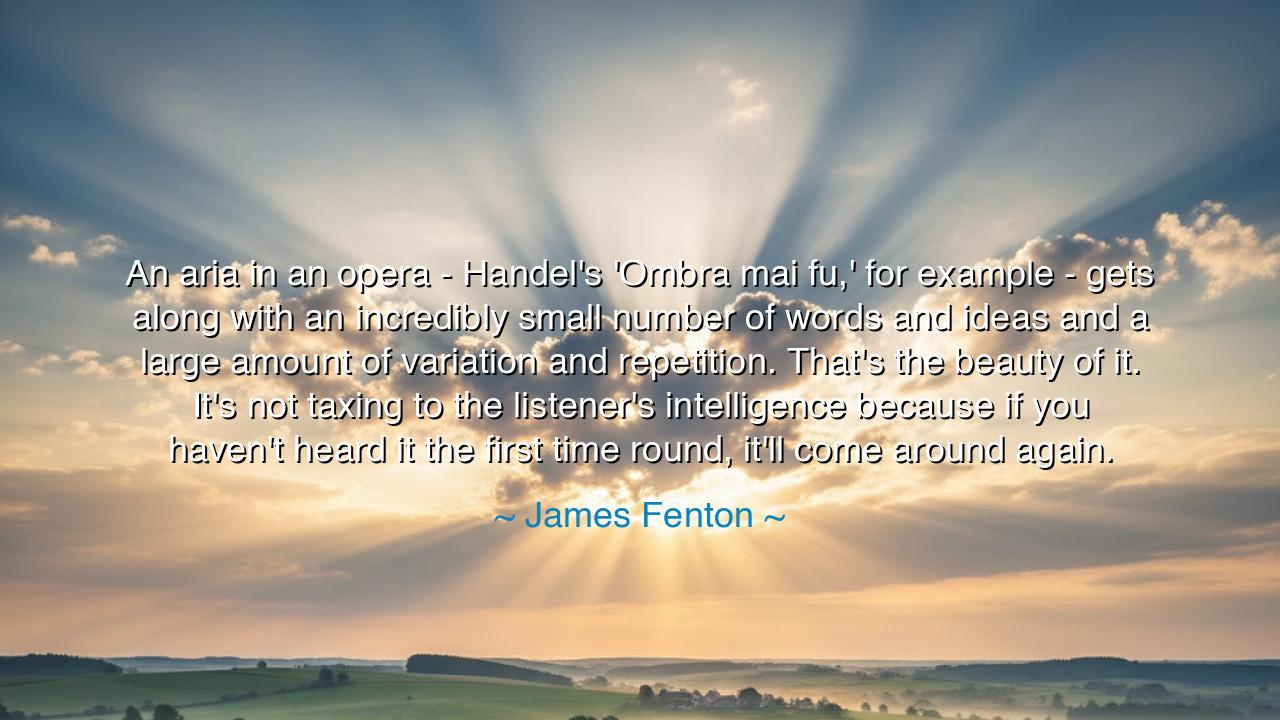
An aria in an opera - Handel's 'Ombra mai fu,' for example - gets
An aria in an opera - Handel's 'Ombra mai fu,' for example - gets along with an incredibly small number of words and ideas and a large amount of variation and repetition. That's the beauty of it. It's not taxing to the listener's intelligence because if you haven't heard it the first time round, it'll come around again.






The words of James Fenton, poet, critic, and lover of music, carry within them a serene truth about beauty, patience, and the rhythm of understanding: “An aria in an opera — Handel’s ‘Ombra mai fu,’ for example — gets along with an incredibly small number of words and ideas and a large amount of variation and repetition. That’s the beauty of it. It’s not taxing to the listener’s intelligence because if you haven’t heard it the first time round, it’ll come around again.” Here, Fenton speaks not only of music, but of the art of life itself — of how simplicity, repetition, and return can bring a deeper joy than endless novelty. In the aria, as in existence, meaning is not always in the multitude of words, but in the lingering of one idea until the soul feels it completely.
To understand this, one must first recall the heart of the Baroque age, when George Frideric Handel, master of melody, composed “Ombra mai fu” — an aria so gentle that it seemed to touch eternity itself. Its words are few: a praise of the shade of a tree, a hymn to peace and stillness. Yet in those few syllables, Handel found infinite variation — weaving tone upon tone, breath upon breath, until the listener is carried beyond the words into the very essence of calm. This, Fenton reminds us, is the beauty of repetition: it is not dullness, but deepening; not monotony, but meditation.
In our time, the world rushes forward, seeking stimulation in every heartbeat — faster, louder, newer. Yet the ancients knew, as Fenton knows, that the soul does not grow through haste but through return. Just as an aria repeats its phrases so the heart may grasp their meaning, so must we revisit the truths of life again and again — love, loss, gratitude, courage — each time discovering them anew. The repetition is not for lack of imagination, but for reverence: for what is worth saying once is worth saying a thousand times, until it becomes part of who we are.
Think of the monks who chant their prayers. Their words, too, are few — often no more than a line of devotion, murmured again and again through centuries. Yet in the echo of that chant lies peace beyond measure. Each repetition refines the spirit, polishing the heart like a stone in a river. The purpose is not to impress the mind but to quiet it, to let the message sink into the depths of being. In this same way, an aria like “Ombra mai fu” invites the listener to rest, to listen not with reason but with the soul. It does not tax intelligence, for it speaks the ancient language of simplicity — a language older than words.
Fenton’s insight extends beyond the concert hall. He teaches us that communication and beauty do not require complexity. The greatest truths — a mother’s lullaby, a lover’s whisper, a poet’s final line — are rarely complicated. They touch us because they return, echoing through time and memory. And like the aria, they allow the listener to catch what was missed the first time, offering second chances to feel, to understand, to awaken. In this, we see mercy woven into art itself — the kindness of repetition, the grace of return.
Let us recall also the lesson of Bach, another master of variation. He could take a single theme — a few simple notes — and through countless transformations, reveal a universe. From simplicity, he drew infinity. So it is in life: those who learn to find wonder in the familiar discover eternity in every moment. The repetition of dawn and dusk, of breath and heartbeat, is not a burden but a blessing. Each cycle is a chance to listen more deeply, to notice what we once ignored.
And so, the lesson of Fenton’s words is clear: do not despise simplicity, nor tire of repetition. Whether in art, in love, or in faith, what returns to you returns for a reason. Listen again. Look again. Feel again. If you did not understand the first time, life will bring the lesson back to you — gently, persistently — until you do. In an age that worships complexity, be like the aria: a few words, infinite depth. Seek not to dazzle, but to endure. Speak less, but mean more. For beauty, as Fenton reminds us, is not always in the new — it is often in the return, the melody that circles back, until the heart finally learns to hear.






AAdministratorAdministrator
Welcome, honored guests. Please leave a comment, we will respond soon